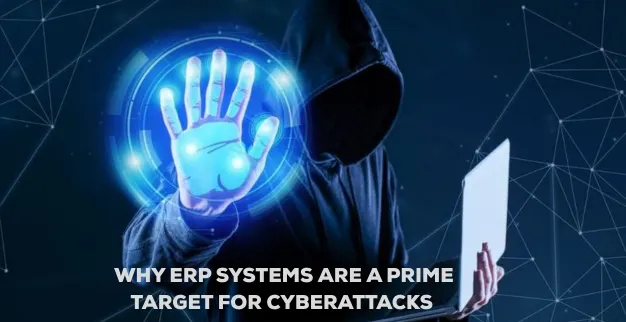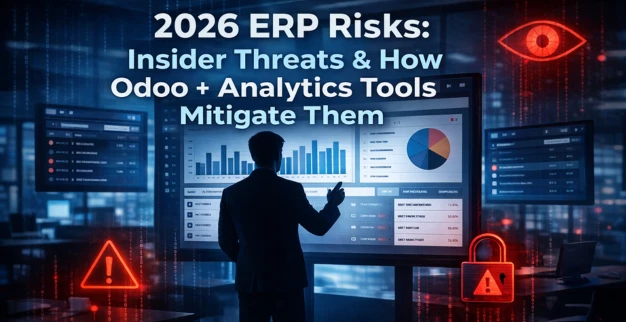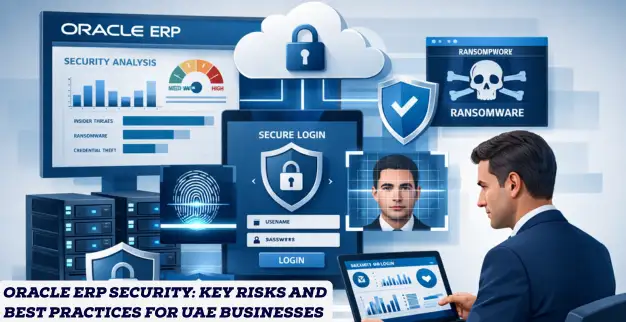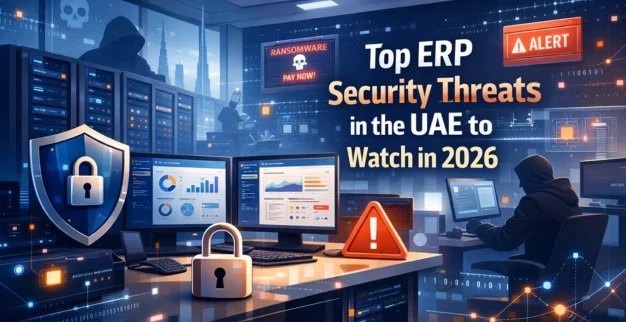Why ERP Systems are a Prime Target for Cyberattacks
By:
Ganesan D
28 May 2025
Category:
ERP Security
Introduction:
Enterprise Resource Planning (ERP) systems are the digital backbone of
many modern businesses, managing everything from finance and HR to
supply chain and operations. With access to such critical data, ERP
systems have become prime targets for cyberattacks. These platforms
often hold sensitive business intelligence, making them attractive for
hackers seeking to exploit vulnerabilities for financial gain or data breaches.
In this blog, we explore why ERP systems are vulnerable,
the most common threats, and how businesses in Dubai and across
the UAE can secure their ERP software effectively.
1. High-Value Data Stored in ERP Systems
ERP systems contain confidential data such as financial records,
employee details, intellectual property, and customer information.
Cybercriminals target these systems to steal, leak, or ransom
critical business data.
Solution: Implement end-to-end encryption and data
access controls to restrict unauthorized access.
2. Complex Architecture Increases Vulnerabilities
ERP systems are often large and complex, with multiple modules
and integrations that can be difficult to secure uniformly.
This complexity creates multiple entry points for hackers to
exploit system vulnerabilities.
Solution: Conduct regular security audits and patch updates
across all ERP modules and integrations.
3. Outdated or Unpatched ERP Software
Many businesses continue using outdated ERP versions due to high
upgrade costs or compatibility issues. Unpatched ERP software is highly
vulnerable to known cyber threats and exploits.
Solution: Keep your ERP software updated with the latest patches
and security fixes from your vendor.
4. Insider Threats and Poor Access Controls
ERP systems are often accessed by multiple users across departments.
Improper access controls or insider threats can lead to intentional
or accidental breaches. Lack of role-based permissions allows unauthorized
users to access sensitive data.
Solution: Enforce strict role-based access control (RBAC) and
monitor user activity logs regularly.
5. Lack of Employee Cybersecurity Awareness
Human error remains one of the leading causes of ERP cyberattacks.
Phishing attacks, weak passwords, and mishandling of sensitive data
expose ERP systems to significant risks.
Solution: Conduct ongoing cybersecurity training and awareness
programs for all ERP users.
6. Third-Party Integration Risks
Many ERP systems rely on third-party applications or plugins for extended
functionality. If these external tools are not secured properly, they can
become backdoors for attackers.
Solution: Vet all third-party vendors and ensure they
comply with cybersecurity standards.
7. Remote Access and Cloud Vulnerabilities
Remote ERP access and cloud-hosted ERP solutions are essential today but
introduce new cybersecurity challenges. Insecure remote connections or
misconfigured cloud environments can lead to data leaks or breaches.
Solution: Use VPNs, secure APIs, and cloud security policies
to safeguard remote ERP access.
8. Regulatory Non-Compliance Risks
Failure to comply with data protection laws such as GDPR or local UAE
regulations can lead to penalties. Insecure ERP systems may expose
businesses to legal risks if a data breach occurs.
Solution: Ensure ERP systems follow local and international data protection
laws with compliance audits.
Reach Us for ERP Cybersecurity in Dubai & UAE
At Agan Cyber Security LLC, we specialize in ERP cybersecurity solutions tailored
for businesses in Dubai and across the UAE. Whether you’re using SAP, Oracle,
Microsoft Dynamics, or custom ERP software, we help identify and mitigate
risks through comprehensive audits, penetration testing, data protection
strategies, and user access policies. Let our cybersecurity experts secure your
ERP infrastructure before it's too late.
Conclusion
ERP systems are critical yet vulnerable assets in the digital
infrastructure of modern enterprises. With cyber threats on the rise,
protecting ERP software is no longer optional—it's essential. From securing
cloud access to managing internal risks and ensuring compliance,
proactive ERP cybersecurity is the key to maintaining business continuity
and data integrity.
Secure your enterprise with Agan Cyber Security LLC—Dubai’s trusted ERP
cybersecurity partner.
Why ERP Systems are a Prime Target for Cyberattacks & Their Solutions
| ERP Cybersecurity Threat |
Explanation |
Recommended Solution |
| 1.High-value data stored |
ERP holds financial, employee, and customer data targeted by hackers
|
Use encryption and data access policies
|
| 2. Complex system architecture |
Multiple modules make it hard to secure all entry points
|
Perform regular vulnerability assessments
|
| 3.Outdated/unpatched software |
Legacy systems are vulnerable to known exploits
|
Keep software updated and patched
|
| 4. Insider threats and poor access control |
Employees may accidentally or intentionally misuse data
|
Apply RBAC and monitor user activities
|
| 5.Low employee cybersecurity awareness |
Users may fall for phishing or use weak credentials
|
Conduct regular training and awareness programs
|
| 6.Third-party integration flaws |
External apps may introduce unsecure connections
|
Vet vendors and restrict third-party access
|
| 7. Remote/cloud access risks |
Insecure remote login or cloud misconfigurations can lead to breaches |
Secure remote access and cloud configurations
|
| 8.Regulatory non-compliance |
Violations can lead to legal penalties if ERP data is compromised
|
Ensure ERP systems meet UAE and international compliance standards
|



